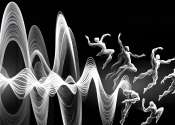'What was that?' How brains convert sounds to actions
You hear a phone ring or a dog bark. Is it yours or someone else's? You hear footsteps in the night—is it your child, or an intruder? Friend or foe? The decision you make will determine what action you take next. Researchers ...
May 10, 2024
0
29









